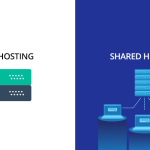When launching a website, one of the most important decisions you'll make is choosing the right type of hosting. Two of the most common options are VPS (Virtual Private Server) hosting and shared hosting. Each has its strengths and is suited to different types of websites. In this blog, we'll break down the key differences between VPS hosting and shared hosting to help you decide which one is the best fit for your needs.
1. Understanding the Basics
- Shared Hosting: As the name suggests, shared hosting means your website is hosted on a server with many other websites. All the sites on the server share the same resources, including CPU, RAM, and disk space. This type of hosting is generally the most affordable and is ideal for small websites or beginners.
- VPS Hosting: With VPS hosting, your website is still hosted on a shared server, but the server is divided into virtualized environments. Each VPS acts like a dedicated server with its own resources (CPU, RAM, etc.), providing more control, flexibility, and reliability compared to shared hosting.
2. Performance and Reliability
- Shared Hosting: In shared hosting, the performance of your website can be affected by the other sites on the same server. If one website experiences a traffic spike, it can slow down the entire server, including your site. Shared hosting is fine for low-traffic sites but may struggle as your site grows.
- VPS Hosting: VPS hosting offers better performance and reliability because your resources are allocated specifically to your site. This means other websites won’t affect your site's performance. VPS hosting can handle higher traffic volumes and offers more stability, making it suitable for growing websites.
3. Security
- Shared Hosting: In a shared hosting environment, the security of your website can be compromised if another site on the server is hacked. Since all sites share the same server, vulnerabilities in one site can potentially affect others. However, reputable hosting providers implement security measures to minimize these risks.
- VPS Hosting: VPS hosting is generally more secure than shared hosting because each VPS is isolated from the others. This isolation means that even if another VPS on the same server is compromised, your site remains unaffected. Additionally, VPS hosting often includes more advanced security features and the ability to install custom security software.
4. Control and Customization
- Shared Hosting: With shared hosting, you have limited control over the server environment. Hosting providers typically manage the server, and you're restricted to the software and settings they offer. This is convenient for beginners who prefer a hands-off approach but can be limiting for advanced users.
- VPS Hosting: VPS hosting provides much greater control and customization. You can install your own operating system, configure server settings, and install custom software. This makes VPS hosting a better choice for developers or businesses that need specific configurations or want more control over their hosting environment.
5. Scalability
- Shared Hosting: Shared hosting is generally less scalable. As your site grows, you may find that the resources available in a shared hosting plan are insufficient, leading to slower load times and reduced performance. Upgrading to a higher shared hosting plan may help temporarily, but eventually, you'll need to move to a more robust solution.
- VPS Hosting: VPS hosting is highly scalable. You can easily upgrade your resources (CPU, RAM, storage) as your site grows, without the need to migrate to a different server. This scalability makes VPS hosting an excellent choice for websites expecting growth or fluctuating traffic levels.
6. Cost
- Shared Hosting: Shared hosting is typically the most affordable option, with plans starting as low as a few dollars per month. It's ideal for personal blogs, small businesses, and anyone just starting out who doesn’t expect high traffic or need advanced features.
- VPS Hosting: VPS hosting is more expensive than shared hosting, with costs depending on the resources and features you choose. However, the price reflects the increased performance, control, and security that VPS hosting offers. It's a worthwhile investment for businesses, e-commerce sites, or anyone needing more than what shared hosting can provide.
Which Should You Choose?
- Choose Shared Hosting if:
- You're launching a small website, personal blog, or portfolio.
- You’re on a tight budget and don’t need advanced features.
- You prefer a simple, managed hosting environment with minimal setup.
- Choose VPS Hosting if:
- You expect your site to grow and need scalability.
- You require better performance, security, and reliability.
- You want more control over your server environment and configurations.
Ultimately, the choice between VPS hosting and shared hosting depends on your specific needs, budget, and the level of control you want over your website. For small, low-traffic sites, shared hosting is a cost-effective and straightforward solution. However, if you're planning to grow, need better performance, or require more customization, VPS hosting is likely the better option.







